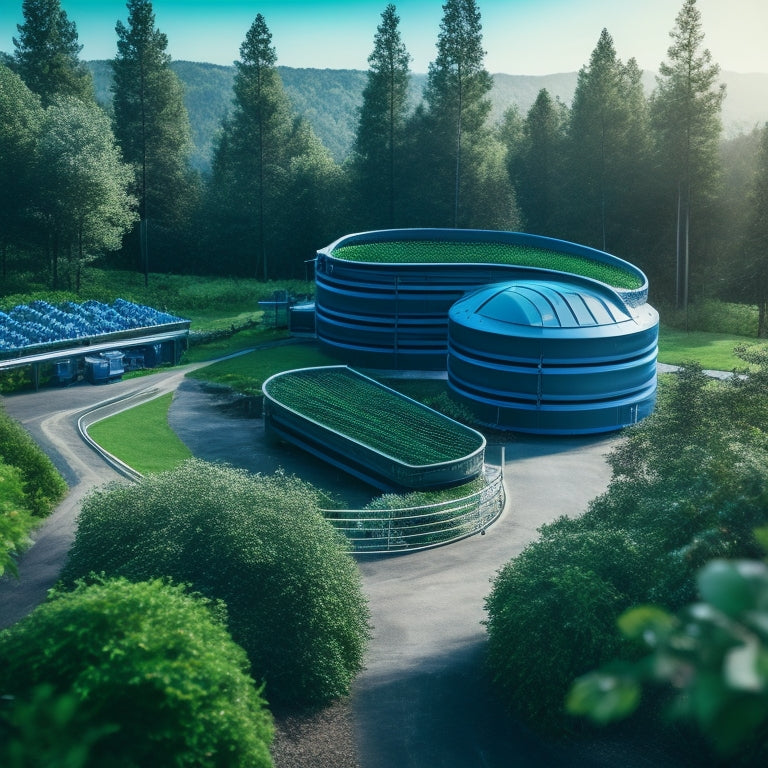
Athens Services Revolutionizes Food Waste Recycling
Share
Athens Services is championing food waste recycling with a thorough program that sets a new standard for responsible waste management in California. The program offers residents and businesses tailored resources, including container sizes and curbside collection options, to make efficient recycling easy. By diverting food waste from landfills, the program reduces methane emissions and supports sustainability initiatives. With California laws emphasizing compliance, Athens Services provides businesses with training and education on recycling laws. As a leader in sustainable practices, Athens Services is empowering the community to aim for a zero-waste future, and there's more to explore on how this initiative is making a significant impact.
Key Takeaways
• Athens Services offers a comprehensive food waste recycling program for single-family homes and multifamily complexes in California.
• Residents can choose from various container sizes to optimize kitchen storage for food scraps and participate in curbside collection or drop-off programs.
• The program sets a new standard for responsible waste management in California, reducing methane emissions and supporting sustainability initiatives.
• Athens Services provides business support and resources, including training and education, to help businesses comply with California laws like SB 1383, AB 341, and AB 1826.
• The company offers downloadable guides, educational materials, and practical tips to help residents and businesses pursue a zero-waste future.
Food Waste Recycling Services
Athens Services offers a thorough food waste recycling program, providing residents with a range of container sizes to efficiently manage their food waste generation and comply with California's SB 1383 regulations.
This all-inclusive program caters to single-family homes and multifamily complexes, ensuring that residents can select suitable container options to manage their waste generation efficiently.
By offering various container sizes, Athens Services enables residents to optimize their kitchen storage for food scraps, making it easier to participate in the recycling program.
With a focus on safety and environmental sustainability, Athens Services' food waste recycling program sets a new standard for responsible waste management in California.
Efficient Recycling Made Easy
Six simple steps can make a significant difference in efficient food waste recycling, starting with the proper collection and storage of kitchen scraps. Implementing sustainable practices in food waste recycling not only reduces waste but also contributes to a healthier environment.
| Step | Action |
|---|---|
| 1 | Collect kitchen scraps in designated containers |
| 2 | Store containers in convenient locations |
| 3 | Empty containers regularly into designated recycling bins |
| 4 | Participate in curbside collection or drop-off programs |
Environmental Impact Matters
Proper food waste recycling practices have a profound impact on the environment, as the decomposition of organic waste in landfills plays an essential role in the production of methane, a potent greenhouse gas.
By diverting food waste from landfills, Athens Services supports sustainability initiatives that reduce methane emissions and promote a healthier environment. Methane reduction is a critical step in mitigating climate change, and food waste recycling is an integral component of this effort.
Compliance and Business Support
California's regulatory landscape, comprising laws such as SB 1383, AB 341, and AB 1826, underscores the importance of compliance in waste management, making business support and resources essential for successful integration.
Athens Services recognizes the significance of compliance and offers tailored resources to facilitate businesses' shift to sustainable practices. By providing training and education on recycling laws, Athens Services empowers businesses to navigate the complex regulatory environment and adopt waste management strategies that align with California's environmental goals.
This support enables businesses to not only comply with regulations but also promote sustainable practices, reducing their environmental footprint and contributing to a zero-waste future.
Resources for a Zero Waste Future
Athens Services provides a wide range of resources, including downloadable guides and educational materials, to support residents and businesses in their pursuit of a zero-waste future. These resources promote sustainable practices and community engagement, empowering individuals to make a positive impact on the environment.
The residential food scrap collection flyer and kitchen pail cheat sheet offer practical tips on reducing food waste and composting. Additionally, Athens Services provides training and support to businesses, helping them implement material reuse practices and comply with recycling laws.
Frequently Asked Questions
What Happens to Recycled Food Waste After It's Collected From My Home?
After collection, recycled food waste undergoes a treatment process, including anaerobic digestion, where microorganisms break down organic matter, producing biogas and nutrient-rich compost, which is then utilized for agricultural and landscaping purposes.
Can I Recycle Food Waste if I Have a Septic Tank or Private Sewer?
"When it rains, it pours," and septic tanks can be overwhelmed by food waste. While private sewer systems have system limitations, residents with septic tanks should exercise private considerations and consult local authorities for guidance on safe food waste disposal and recycling options.
How Do I Keep Pests Out of My Food Waste Recycling Container?
To keep pests out of your food waste recycling container, implement odor control measures like regular cleaning and covering scraps, and utilize wildlife deterrents such as secure lids, weighted containers, and animal-repellent liners.
Are There Any Food Waste Recycling Programs for Commercial Kitchens?
In bustling commercial kitchens, efficient food waste recycling programs can thrive with tailored solutions. Commercial incentives, such as tax breaks and rebates, encourage participation, while upgraded kitchen infrastructure, like dedicated recycling stations, facilitate seamless integration and pest-free management.
Can I Use Biodegradable Bags in My Food Waste Recycling Container?
When using biodegradable bags in food waste recycling containers, it is crucial to note that not all biodegradable options are suitable. Choose bag alternatives like paper liners, certified compostable bags, or reusable containers to guarantee safe and efficient recycling.
Related Posts
-

Smart Storage Solutions for Small Kitchen Spaces
You're struggling to find space in your small kitchen, but don't worry, smart storage solutions can help. Start by ut...
-

Mastering the Art of Darkroom Photography
You're about to enter a precise, hands-on world where you'll enhance your photographic vision into museum-quality pri...

